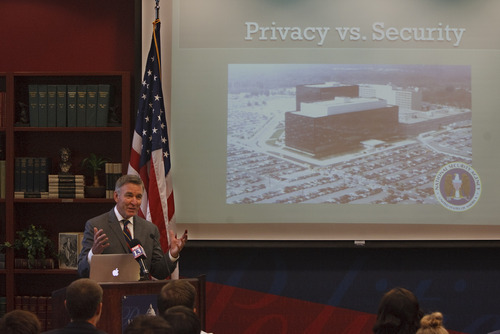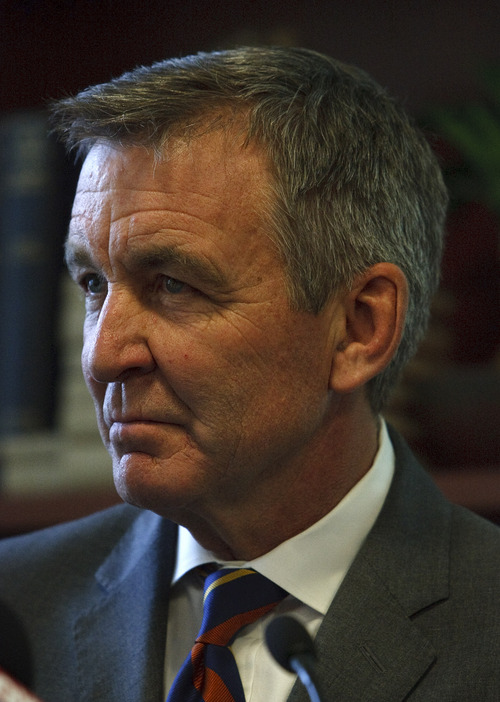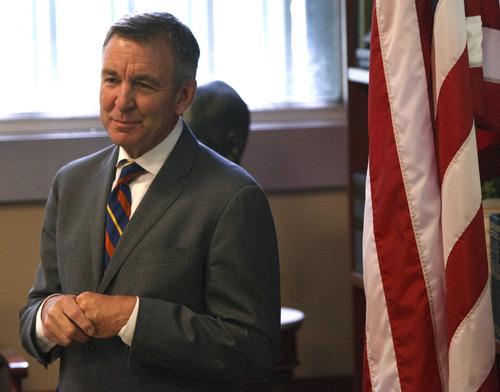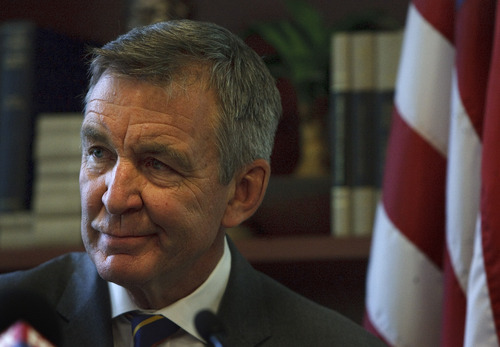This is an archived article that was published on sltrib.com in 2013, and information in the article may be outdated. It is provided only for personal research purposes and may not be reprinted.
The Utah judge who spent seven years reviewing top-secret warrants to gather electronic data on terror suspects and ordinary Americans spoke about the experience publicly for the first time Thursday and assured an audience that the court and the laws it upholds are sound.
U.S. District Court Judge Dee Benson said at his height on the Foreign Intelligence Surveillance Court he would review 70 or 80 warrant applications a week. Some were to access the contents of emails or other communications sent or received by specific individuals. Other times, the federal government sought broad swaths of metadata from communications companies, Benson told about 100 students, faculty and citizens at the Hinckley Institute of Politics on the University of Utah campus.
The classified court is no rubber stamp, according to the judge.
"I would say once a week, I would turn down an application," Benson said.
Benson cited statistics showing the court approves 99 percent of warrant applications, but argued those numbers didn't count the requests the government withdraws after a judge rejects the application. Benson said he saw as many requests withdrawn as he rejected.
He did not identify any specific people or companies who were subject to the warrants.
Sometimes the government would seek a warrant even though it could have obtained the records through what's called a national security letter. Benson would sometimes ask government attorneys why they were using the surveillance court.
"They would say, 'Well these companies aren't very comfortable giving us this without a court order,'" he said.
—
Snowden's leaks • Benson's presentation came after a summer of revelations about U.S. intelligence gathering fueled by the leaks from former defense contractor Edward Snowden. Benson implied he did not support Snowden's actions, saying Snowden "stole classified documents," though Benson also gave Snowden credit for spurring a national discussion on intelligence gathering.
Benson said he received interview requests from across the country to discuss the surveillance court, including an offer from "Nightline" to fly him to ABC News studios. He rejected them all.
Benson said his term on the court began in 2004 with a phone call from then-U.S. Chief Justice William Rehnquist.
"I didn't think he was calling for a friendly chat," Benson recalled. "I'm a little old judge in Utah and I wondered what I'd done wrong."
Rehnquist asked Benson to serve on the surveillance court. Benson agreed then asked an intern to look up what the Foreign Intelligence Surveillance Court was. The court has seven district judges from across the country who serve seven-year terms taking turns reviewing the warrant applications. Benson said he would fly to Washington every nine or 10 weeks to take his turn as the lone judge reviewing the surveillance warrants. Information in the applications and warrants were classified, so Benson could only review the material in a secure office.
In 2005, The New York Times revealed the Bush Administration had conducted wiretapping without a warrant. Benson said after that, the Administration used the surveillance court "religiously." The number of warrants he reviewed declined to about 50 per week after the law was amended in 2008 to allow for more warrantless wiretapping of foreigners abroad.
Benson criticized news reports claiming the government is spying on Americans. He emphasized the content of communications cannot be accessed without the approval of a judge on the surveillance court.
"I wish every American can see how dedicated each of those judges" are, Benson said.
Benson made references to briefings he received on communications technologies and techniques employed by terrorists. He called Director of National Intelligence James Clapper "a great guy" but disapproved of Clapper lying to Congress about the use of intelligence gathering.
As Benson finished his prepared remarks, Marriott Library Director Alberta Comer reminded students they could learn more about American surveillance at the library. To which a laughing Benson responded: "And bear in mind everything you check out from the library the NSA is going to know about."
—
Why so secretive? • In the question-and-answer session, XMission founder and CEO Pete Ashdown asked Benson why the surveillance court has to be so secretive. Few of the court's decisions are ever made public.
"Why is the [government] trust of the American people so low?" Ashdown asked.
Benson replied that search warrants, by their nature, are secretive.
"We don't have a hearing to determine if the government can tap a drug dealer's phone," Benson said.
Amie Stepanovich, director of the Domestic Surveillance Project at the Electronic Privacy Information Center, on Thursday also questioned why surveillance court decisions are classified. The effect has been to make the court a lawmaking body in violation of the separation of powers.
"We have moved into a system of secret law that is completely in opposition to what the founders had imagined," Stepanovich said.
As the discussion finished, Benson warned against the government circumventing the surveillance court, but said he sees no need for further changes in the law or the court.
"The law is pretty good. I just hope no one has been misusing it," Benson said.
Twitter: @natecarlisle









